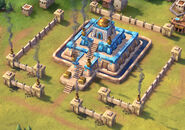(Added information to intro.) Tag: Visual edit |
m (→Civilopedia entry: Tweaked punctuation.) Tag: Visual edit |
||
| Line 19: | Line 19: | ||
== Civilopedia entry == |
== Civilopedia entry == |
||
| − | When the Egyptians were building pyramids along the Nile, the Akkadians, Sumerians, Elamites, Babylonians and Assyrians were building ziggurats all over Mesopotamia. These were terraced pyramids, sometimes truncated so a temple could be placed on top. The earliest date from the Early Dynastic Period, roughly 2900 to 2400 BC, and the newest found date to c. 600 BC. Sun-baked bricks made up the center, and were faced with fire-glazed bricks that were more durable. Unlike the Egyptian pyramids, the ziggurats were generally solid, with shrines and temples on the summit, occasionally more than one (since one |
+ | When the Egyptians were building pyramids along the Nile, the Akkadians, Sumerians, Elamites, Babylonians and Assyrians were building ziggurats all over Mesopotamia. These were terraced pyramids, sometimes truncated so a temple could be placed on top. The earliest date from the Early Dynastic Period, roughly 2900 to 2400 BC, and the newest found date to c. 600 BC. Sun-baked bricks made up the center, and were faced with fire-glazed bricks that were more durable. Unlike the Egyptian pyramids, the ziggurats were generally solid, with shrines and temples on the summit, occasionally more than one (since one didn’t want to offend any god). Sadly none of the shrines or temples have survived – thanks to war, earthquakes and religious fervor – although the great piles of brick have. There were a number of “great” ziggurats, including the one in Babylon dedicated to the god Marduk which may have inspired the fable of the Tower of Babel. |
== Gallery == |
== Gallery == |
||
Revision as of 17:11, 18 May 2019
![]() Back to the list of tile improvements
Back to the list of tile improvements
The Ziggurat is a unique tile improvement of the Sumerian civilization in Civilization VI. It is available without any technological research and cannot be built on Hills.
- Effects:
- +2
 Science
Science - +1
 Culture if placed adjacent to a river
Culture if placed adjacent to a river - +1
 Culture (with Natural History)
Culture (with Natural History)
- +2
Strategy
Well-placed Ziggurats can allow the Sumerians to become scientific leaders without neglecting their civic development, or else focus on ![]() Culture production without falling hopelessly far behind in the tech race. Moreover, they can be built as soon as the game begins, so the Sumerians can get an early lead in
Culture production without falling hopelessly far behind in the tech race. Moreover, they can be built as soon as the game begins, so the Sumerians can get an early lead in ![]() Science and
Science and ![]() Culture output by founding cities near rivers and lining their banks with Ziggurats. These improvements can even be built on tundra and snow tiles, giving the Sumerians some incentive to settle in these frigid lands if there are rivers nearby (and possibly making it easier for them to find places to establish National Parks).
Culture output by founding cities near rivers and lining their banks with Ziggurats. These improvements can even be built on tundra and snow tiles, giving the Sumerians some incentive to settle in these frigid lands if there are rivers nearby (and possibly making it easier for them to find places to establish National Parks).
Civilopedia entry
When the Egyptians were building pyramids along the Nile, the Akkadians, Sumerians, Elamites, Babylonians and Assyrians were building ziggurats all over Mesopotamia. These were terraced pyramids, sometimes truncated so a temple could be placed on top. The earliest date from the Early Dynastic Period, roughly 2900 to 2400 BC, and the newest found date to c. 600 BC. Sun-baked bricks made up the center, and were faced with fire-glazed bricks that were more durable. Unlike the Egyptian pyramids, the ziggurats were generally solid, with shrines and temples on the summit, occasionally more than one (since one didn’t want to offend any god). Sadly none of the shrines or temples have survived – thanks to war, earthquakes and religious fervor – although the great piles of brick have. There were a number of “great” ziggurats, including the one in Babylon dedicated to the god Marduk which may have inspired the fable of the Tower of Babel.


